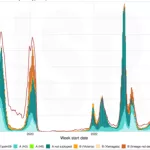In an age marked by digital connectivity, a silent epidemic—loneliness—is gripping millions and posing profound health risks. In the U.S., one in three adults report chronic loneliness, a condition now recognized as being as dangerous to health as smoking or obesity. From mental health challenges like anxiety and depression to physical conditions including heart disease, stroke, and neurological disorders, loneliness has effects that transcend emotion, compromising both brain and body health.
The magnitude of the crisis was underscored in a 2023 advisory from the U.S. Surgeon General, which described loneliness and social isolation as an epidemic. “Given the significant health consequences of loneliness and isolation, we must prioritize building social connection in the same way we have prioritized other critical public health issues such as tobacco, obesity, and substance use disorders,” the report stated.
But how does chronic loneliness specifically impact health? According to a growing body of research, loneliness is not only pervasive but also increasingly recognized as a significant risk factor for serious illnesses.
Loneliness: A Major Health Hazard
Dr. Anna Finley, a psychology professor at North Dakota State University, clarifies that loneliness and social isolation are distinct yet interconnected issues. “Social isolation is an objective measure of interaction, while loneliness is the subjective feeling of a lack of meaningful connection,” she said. Many people experience loneliness despite being surrounded by others because true social connection involves quality, not just quantity.
In recent years, researchers have drawn stronger links between loneliness and several health conditions. A statement by the American Heart Association linked loneliness with coronary heart disease and stroke mortality. Loneliness and social isolation also increase the risk for anxiety, depression, dementia, and even death, with studies indicating that addressing loneliness could prevent up to 20% of depression cases in adults over 50.
Research led by Dr. Indu Subramanian, a neurology professor at UCLA, found that loneliness can significantly worsen symptoms in Parkinson’s disease, rivaling the benefits seen from regular exercise. Subramanian also highlighted the stigma surrounding loneliness, which often prevents sufferers from reaching out to doctors or family members for support.
Early Mortality and Loneliness
Research from Dr. Julianne Holt-Lunstad, professor of psychology and neuroscience at Brigham Young University, has shown that loneliness and social isolation are independent risk factors for early mortality, increasing it by about a third—the equivalent of smoking 15 cigarettes per day. Holt-Lunstad noted, “We have robust evidence showing the harmful effects of loneliness across a variety of health outcomes.” Her research suggests that while isolation often impacts physical health, loneliness primarily affects mental health, though both have overlapping consequences.
Dr. Finley added that animal studies reinforce these findings, indicating a causal link between loneliness and adverse health outcomes. She noted that brain scans reveal that subjective feelings of loneliness—more than the number of social connections—are associated with altered brain function, affecting emotional perception and social behavior.
Reduced Trust and Social Engagement
Some researchers, like Dr. Dirk Scheele of Ruhr University Bochum in Germany, are investigating why chronic loneliness persists despite ample social opportunities. Scheele’s studies using functional MRI found that high-lonely individuals had reduced activation in the insula cortex during trust-building exercises, which hampers their ability to trust others and exacerbates social disconnection. Additionally, those experiencing loneliness produced lower levels of oxytocin, a hormone tied to bonding, which may explain why they struggle to form new connections.
Loneliness: A Fundamental Need Similar to Hunger
Dr. Livia Tomova from Cardiff University has compared the brain’s response to social isolation with that of food deprivation, revealing that isolation triggers cravings akin to hunger. Her studies show that the brain’s reward centers, especially those that regulate dopamine, become activated when people experience loneliness, suggesting that social interaction is as fundamental to humans as food.
Neurological Impact: Gray Matter Reduction in Lonely Individuals
Sandra Düzel and colleagues from the Max Planck Institute for Human Development identified a negative correlation between loneliness and gray matter volume in brain areas responsible for memory and emotion regulation. Prolonged loneliness, which elevates stress hormone levels, may lead to reduced cognitive and emotional capacity.
Are Interventions to Combat Loneliness Effective?
Experts agree that interventions are crucial. Dr. Holt-Lunstad emphasized the need for urgent action, supported by strong evidence that loneliness can be devastating. Some countries now use “social prescribing” in healthcare, where doctors recommend activities or social interactions. While Subramanian supports such measures, she cautioned that these programs may be challenging to implement in the U.S. due to its healthcare system’s limited focus on preventive care.
For some, social prescribing alone may not be enough. As Dr. Finley noted, effective interventions must address each individual’s unique challenges, whether they involve mobility issues, financial constraints, or lack of supportive relationships.
Tomova and Scheele further advocated for social skills training as a potential solution, particularly for those who find it difficult to initiate and maintain connections. Scheele proposed psychotherapy to target negative belief systems, which often prevent those with chronic loneliness from trusting others or participating in social activities.
Holt-Lunstad concluded that healthcare providers must recognize loneliness as a critical health risk and receive the training necessary to identify and support at-risk individuals. With proactive measures and heightened awareness, experts hope to reverse the loneliness epidemic, improving both the mental and physical health of those affected.











